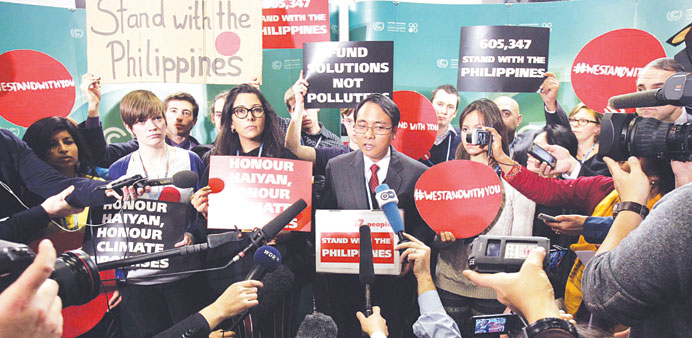|
Negotiations under the UN Framework Convention on Climate Change (UNFCCC) rarely show on the public’s radar, except perhaps in the scenes of bickering over who’s to blame for global warming and who will foot the bill for it. |
The talks are as complex as they are important, involving technical issues that lack colour and emotion – and for many ordinary people, bewildering or mightily tedious.
But this year’s round in Warsaw has been jolted into life by the catastrophe that has struck the Philippines, providing a passionate reminder of the life-and-death issues that underpin the grinding UN process.
The spark has come from the Philippines’ negotiator, Naderev Sano, whose father’s home town is Tacloban, flattened by Super Typhoon Haiyan.
As the COP19 conference heads towards its climax, Sano told AFP on Monday that some of his relatives had “perished” and that he was still waiting to hear whether others are dead or alive.
At the start of the 11-day talks, Sano won a standing ovation for a desperate appeal for countries to strike a deal to avert mass tragedies of this kind.
Sano put his convictions on the line by going on “a water-only fast” for the duration of the meeting in solidarity with suffering Filipinos and to ramp up pressure on fellow negotiators.
“I may perish and be forgotten. But the fight for justice should forever by etched in people’s hearts,” he wrote several days into the fast on his Twitter feed.
A specialist in climate-related disasters for 16 years, becoming the Philippines’ climate commissioner in 2010 after working in green groups, Sano describes himself as an “old soul; environmentalist; philosopher; father; nature lover; peace activist; revolutionary”.
An avid scuba diver, he also has a propensity for tweeting quotes by Gandhi, Mandela, Steve Jobs and Filipino revolutionary hero Jose Rizal.
His homeland has been described as the world’s second most vulnerable country to extreme weather, being hit by an average 22 typhoons per year.
Economic losses from last year’s category five Typhoon Bopha are pegged by Filipinos at a whopping $828mn (615mn euros).
Sano’s blaze of rhetoric and the toll of death and misery from Haiyan have helped to place the plight of developing countries centre-stage at the talks, two years before a much-trumpeted climate pact is to be sealed.
Poor countries say they not only fear the brunt of storms, droughts and floods from a damaged climate system. They point out bitterly that they are least to blame for it: the carbon demon was unleashed by the rich countries of today, burning coal, gas and oil to propel their rise from poverty.
Dozens of activists have joined Sano in fasting, downing their forks and sporting a red button on their clothing to denote solidarity.
“We’ll be carrying on this fast until next Friday barring some radical action from our politicians,” said Anjali Appadurai, an activist with Friends of the Earth Sri Lanka.
“Mother Earth will give you strength,” tweeted Claudia Salerno, a Venezuelan delegate who literally drew her own blood in a protest at the chaotic final scenes of the UNFCCC’s 2009 Copenhagen summit.
“This is our fight, Yeb,” she said, referring to the name used by Sano’s friends. “We must win for our kids.”
Others have seized on the Philippines disaster to pound out a similar message.
UN leader Ban Ki-moon, speaking in Lithuania on Monday en route to Warsaw where the conference will climax with a three-day ministerial meeting, said Haiyan was “clearly a wake-up call”.
Charismatic and bespectacled with a shock of black hair falling across his forehead, Sano appeared fatigued but kept working as usual in week two of the UN conference.
Aside from emissions cuts, he sees the implementation of a Green Climate Fund, to help poorer countries adapt to climate change, and a deal on a compensation mechanism for those worst hit as a top priority – an issue that has added one more thorn to the negotiations.
Terming the loss and damage mechanism as being “key” for his country now “bearing the brunt of the climate crisis”, Sano told AFP he would fast until it “sees light” at Warsaw.
But on Monday he said initial negotiations on the mechanism “should have been closed at the weekend”. “That’s an indication that this still remains (...) a very contentious issue.”
An independent source close to the Filipino delegation told AFP on Monday the US, Japan and the European Union among others are opposing the mechanism.

